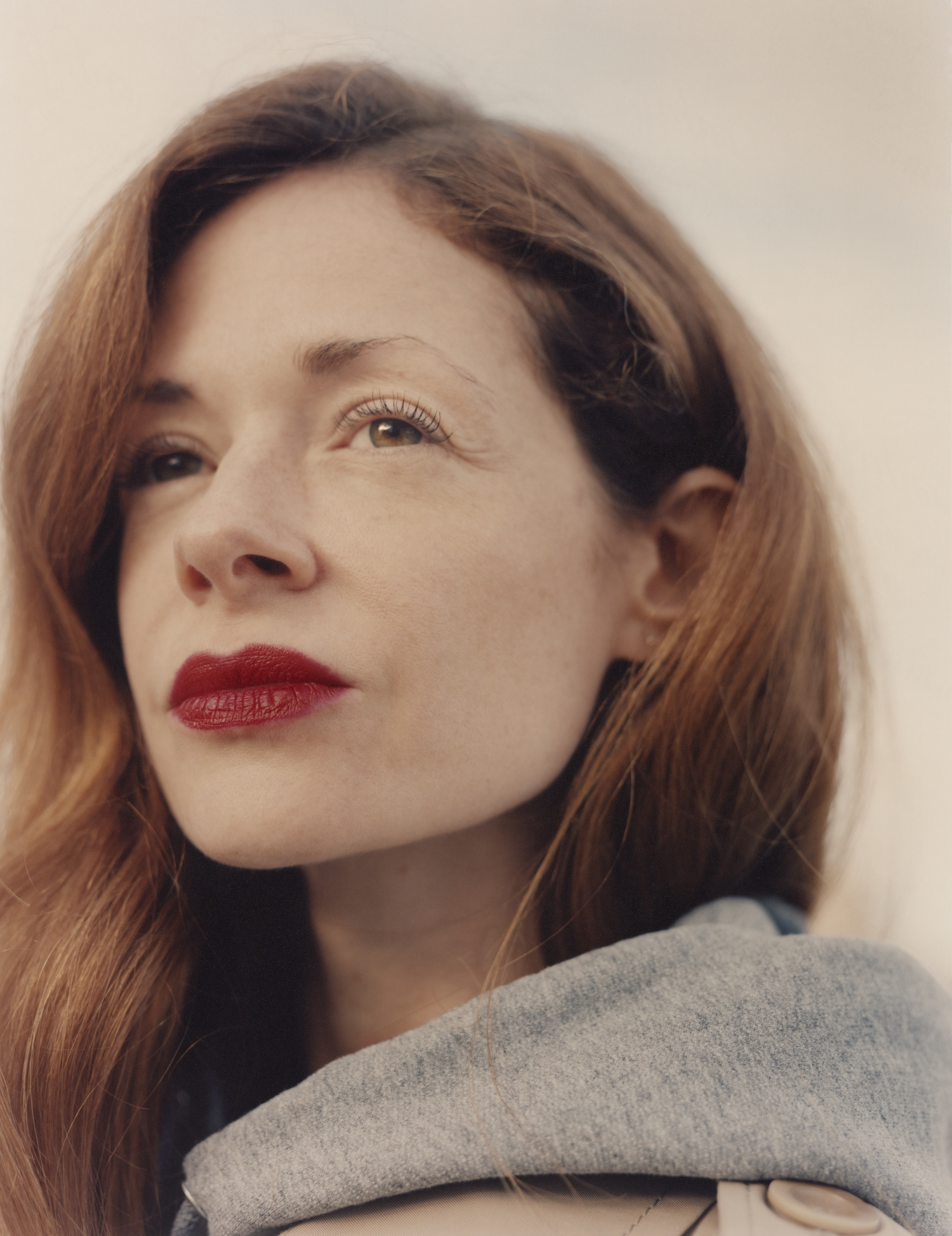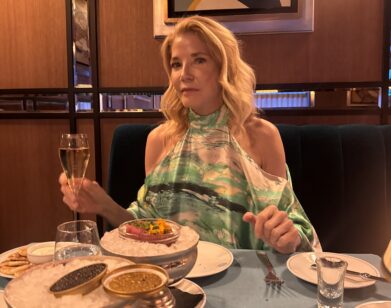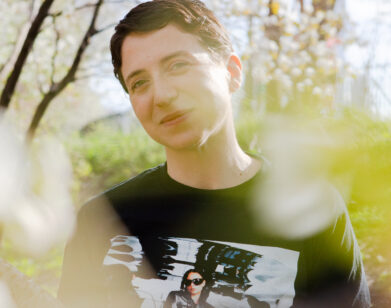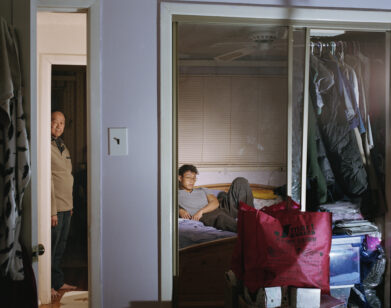literature
Author Stephanie LaCava on Art World Seduction and Survival

Photo by Andreas Laszlo Konrath.
The writer Stephanie LaCava recently texted me asking if I happened to know anyone with a tarantula. I didn’t ask her to explain why—and no, I don’t presently have any tarantula contacts, though I’m in the market—but the question felt characteristic, in a way. LaCava’s writing is peculiar, specific, and unexpectedly twisted. Packaged in charm and readability, it’s an alluring, singular mix.
Her latest novel, The Superrationals, will be released by Semiotext(e) this October. It’s part of the publisher’s “Native Agents” imprint, which has been dedicated to radical first-person subjectivity since its 1990 launch. (She’s in good company; the imprint has also published books by the likes of Lynne Tillman and Eileen Myles.)
The Superrationals intersperses first-person narrative—passages from the perspectives of the auction house employee Mathilde, It-girl philosopher Gretchen, wistful writer Robert, art market darling Tom, and a catty group called “Girls”—with Mathilde’s in-progress art history dissertation on the uncanny. As we get to know our cultivated, detached protagonist, the themes in her dissertation—concerning strangeness, discomfort, disconnect, and the erotic—begin to take over the story.
———
CASSIE PACKARD: Fiction is new for you. Your last book was a memoir and your editorial writing tends to be more essayistic. What led you to work with a new genre? And about the art world, of all things!
STEPHANIE LACAVA: It’s funny to think about this question, considering Mathilde’s “bad” work in progress that’s spread throughout sections of the novel. This could have been me unwilling to let go. [Laughs] The book started off as an attempt to create a plot that was an anagram. This eventually bled into a different web. The common strand between my writing is strangely a tendency to leave things out. It’s not a technical thing, but more intuitive. There’s always a lot of research that may show up in stealth ways. I’m not sure I was super conscious of going into a new genre. The art world setting isn’t gratuitous, it’s more as a backdrop for the same questions.
PACKARD: I’m interested in this idea of plot-as-anagram. Can you expand on that a little?
LACAVA: At first I wanted to give myself a restraint, kind of Oulipoean. I said, let’s try to make the plot fold over into itself or have a hidden puzzle that can be rearranged. It became clear that this couldn’t come at the expense of the characters. So there’s no real plot, but a web of collage and stories.
PACKARD: The text shuttles between the perspectives of leading characters—including a group dubbed “the Girls”—juxtaposed with Mathilde’s critical theses on art. Through this transgressive structure the narrative becomes a collage, with all sorts of surprising interconnections floating to the surface. How did it all come together?
LACAVA: My use of a kind of collage of form is not so radical, but another version of something people I admire have been doing for a while—kind of hidden in the form of a more breezy story. There is this idea of a collective voice coming from all the parts as well as the Girls. I like the idea that it’s difficult to pin down the source of an experience as something singular when there’s so much noise, code, waves, and feedback. These voices can contradict one another, and then there’s the question of what objects exist as proof.
PACKARD: Rich complexity nested within a breezy, delectable story feels like a fair characterization of this book. You mentioned people whom you admire who work in a similar mode—want to list a few?
LACAVA: I meant people who use a collage form—Jean-Jacques Schul’s Dusty Pink, for example. There is also a list of filmmakers who have this approach which seems to make sense to compare to the book: early-on Maya Deren or Isidore Isou.
PACKARD: To what extent is the book drawn from lived experience? You nail art world tropes like the quest for “A+” consignments, the gossipy overeducated junior employee, and the tableau vivant group Halloween costume. I’m also wondering whether your background in translation and publishing might have informed the arc or content of the book.
LACAVA: The book is not autofiction, and I’ve never worked in an auction house or gallery. I’m always listening and watching what’s going on around me. I’m also always looking for what’s not being said or not going down, and how this changes and shifts. Again, background feedback is both a source of and a distraction from reality. I feel I’m about to turn the interview around, which I know I’m not supposed to do, but I want to hear how you thought it related to your experience working at a large gallery, as you did a year ago. [Laughs] You don’t have to answer that. This always happens at least once in an interview with me. You have to keep me on course.
PACKARD: Ha! Sneaky. I remember meeting you at an event in the artist-designed bar of said large gallery a couple of years back—maybe you were already doing research! You totally sold me on a Leïla Slimani book that night, which seems apt now.
LACAVA: Ah, I find her intriguing in many ways, not only the writing. It’s good to see the French press embracing her. She was also appointed by Emmanuel Macron to promote French language and culture.
PACKARD: I’m intrigued by the book’s title, The Superrationals. I actually remember learning about superrationality in a college psychology class, when we discussed the Prisoner’s dilemma. It refers to a mode of reasoning in which a player is playing rationally with the meta-awareness that the other player is also playing rationally. (Did I explain that correctly?) I’m curious as to why you chose this title. Does it refer to the mind games that people play to advance in the art world?
LACAVA: The title did come from the idea of superrationality in game theory. Can you ever know the mind of your counterpart in a wager? Should this change what you want? It’s interesting too if someone operates from a careerist point of view with regards to choosing or even creating connection. Seduction can happen on different planes. It may even have become so commonplace in certain environments that it’s become subconscious for certain people to act this way.
What does survival mean in this landscape? You can’t predict emotional outcomes no matter how much data you have. This is scary and also really exciting. What happens if a workplace rewards behavior that leads to gains which is antithetical to one’s personal or political beliefs? This kind of success is really fucked up. Even more so, is that everything has become so entangled. I saw a line in a piece in The Washington Post yesterday, I think it was: “Ideology is second to notoriety.” That’s a dangerous place to be. Idealism versus ambition. It’s also one of the oldest stories; think Lady Macbeth.
PACKARD: In your memoir, you recount your childhood in Paris through objects of personal importance. Here, people become objects—more so, even, than the artworks themselves, which often take a backseat. Beautiful women, in particular, are seen as objects of beauty, and thus objects of use. There’s something interesting in those unsettling moments when Mathilde inhabits both subject and object positions in an effort to navigate the sexism, misogyny, and patriarchal structures of her industry.
LACAVA: What if Mathilde is the most reliable narrator in all of this? The young girl who doesn’t pause to tell you how she feels, only what she sees, herself too outside-in. It’s hard to separate the object from the surrounding context, what’s for sale. The first book was selling a young girl’s story, not giving away too much. I write mysteries, but they are shelved in different sections.
PACKARD: I think that not giving away too much, or withholding, is part of the allure of these stories.
LACAVA: For sure. It’s funny, with regards to my first book, I remember reading a review that said what’s remarkable about this memoir is how little of Stephanie is in it at all. I liked that.
PACKARD: Gertrude Stein warned authors to “be careful about writing about sex.” It’s a famously unwieldy topic to write well about, and when assault is involved, I can imagine that it would become even more challenging. How did you approach writing about sex?
LACAVA: I think Mathilde’s agency felt really important to explore. How far can she go from her past? How much is she defined by her partners? How close can two people be before they combust? Again, she’s kind of hovering outside herself, disassociating to get by. So this impacts what we see. She zooms in on objects, even in intimate moments. I know there is a prevailing sentiment that literary sex scenes are horrible. This is often true. I just wrote trying not to break with how Mathilde sees everything else. I like reading women writing on desire. I love Annie Ernaux’s Simple Passion, for example.
PACKARD: Tell me more about this through line of misogyny. It seems to be embodied by three male characters: Tom, the arrogant wunderkind painter; Charles, the auction house big-shot; and Christopher, the narcissistic writer.
LACAVA: Yes, and it’s true it’s easy to confuse them with one another. They are supposed to be interchangeable in this way. Each one is seeing Mathilde or Gretchen as an agent of what they want when they want it. Christopher, in particular, is withholding with regards to Gretchen. Jack is the only one who shows care. It’s also acknowledged that he’s the only one who also doesn’t see Mathilde as a cipher, a vector for projection. Robert too is different, especially in that he tells us how he feels. He is tender, but not self-aware in many ways, even though he too is a writer. You are right that there is a vortex of misogyny that feels heavy, but there are also men that want to love, to not be emotionally avoidant.
I thought a lot about Joseph Kessel’s novel that was the basis for Luis Buñuel’s film Belle de Jour. Sure, it was in the late ‘60s, but there is still something very significant about challenging the prevailing narrative that the woman who goes off-piste is headed for disaster. You or yours will be punished for your desires, a long tradition of storytelling that punishes wayward women.
PACKARD: Since Pandora, if not further! There needs to be an eighth story archetype. Or maybe, to a misogynist, a story of punishing wayward women can be filed under Overcoming the Monster…
LACAVA: It’s funny because the women of Olympus, the Greek goddesses are quite strong and reactive. Even Persephone gets to be above ground for six months. She ends up happy as the wife of Hades in the Underworld. It’s even written that he is compassionate and they have this compromise. There is debate on whether or not she went willingly, but this is another talk. Fast forward to modernity and there are the very basic examples of Flaubert’s Madame Bovary and Tolstoy’s Anna Karenina.
PACKARD: Mathilde and Gretchen form the only pair of friends in the book, but they are so self-involved that genuine connection seems out of the question. To me, they almost seem like one another’s amateur cryptologists, as they apply their considerable knowledge of psychology, philosophy, and critical theory to the periodic dissection of text messages from their love interests. How would you characterize their bond?
LACAVA: The question of any two people’s hope of connection is central to the book. I’m also intrigued with how we communicate or misread one another. How many times have you been asked to decode someone else’s text message for intentions? There’s also the doubling of Mathilde and Gretchen, doppelgängers, confusion, as with the men above.
PACKARD: To an extent, the plot resides in—and moves through—those frequent misreadings, futile decodings, and failed liaisons. Mathilde and Gretchen’s dynamic certainly poses questions about intimacy: what it should look like, whether it’s possible, whether it’s even desirable. I’m curious, in general, about your thoughts on female friendship.
LACAVA: I find female friendship really confusing sometimes. Mathilde and Gretchen try to hold each other accountable. I’m tired of reading friendships where one doesn’t challenge the other. I guess that’s also how I look at my own relationships. It’s a bit masochistic maybe, but I want to invest in things that push back at me. If it feels too easy or fun even, I feel like I don’t deserve it. Or maybe I get bored of it. It’s a link back to the uncanny that’s explored in the book. What feels familiar? What feels strange? Can you game this?
PACKARD: Most things, many things, and I hope so! What’s next for you?
LACAVA: I am almost finished with my next book. It’s oddly the inverse of this one, dealing more with the visceral and feelings, but still somehow outside-in. I also have a lot of books to read. Can I interview you now?






